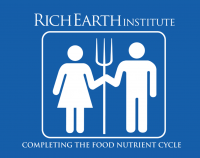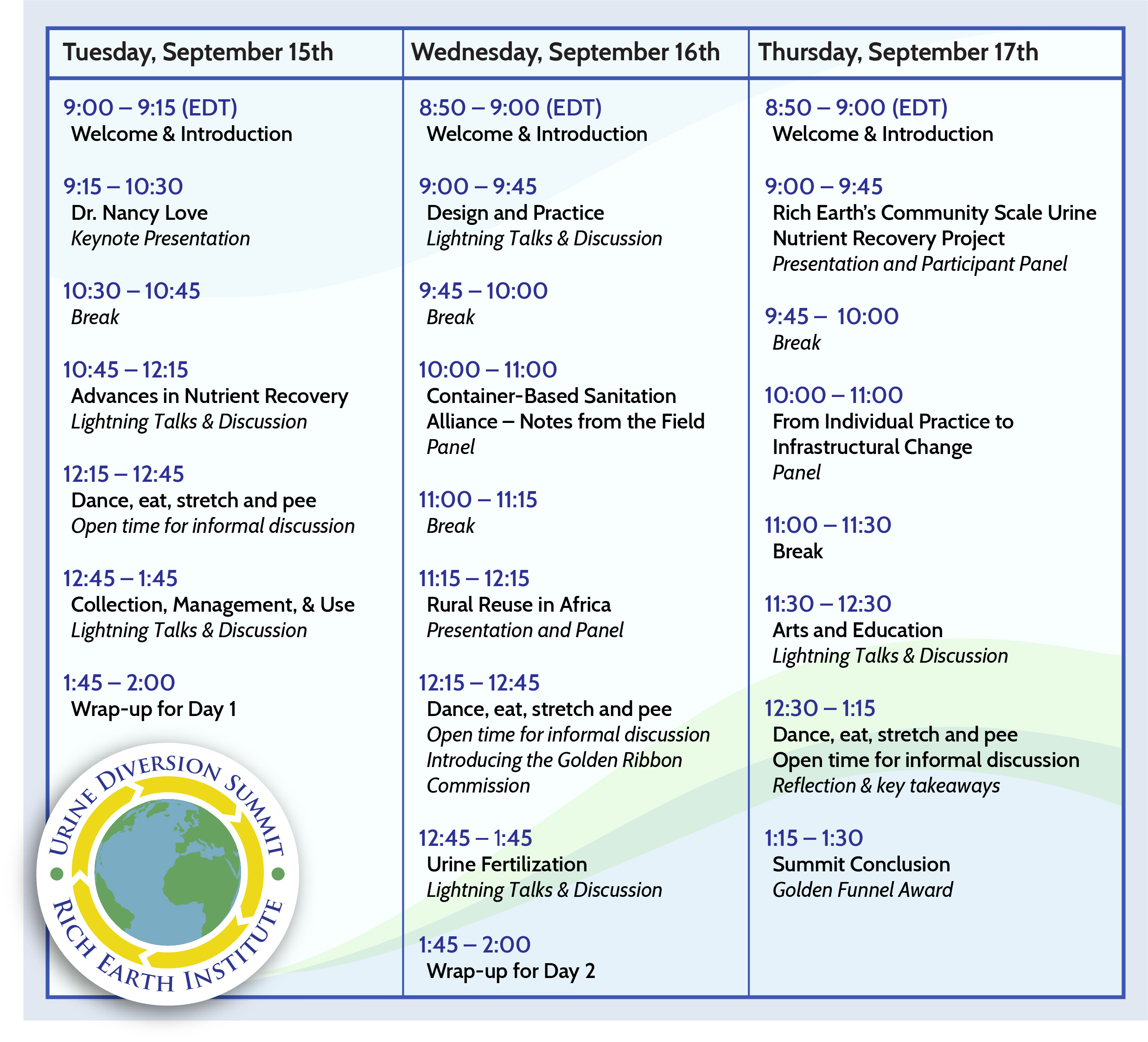- Resource recovery
- Fertiliser, soil conditioner, production of crops
- Urine reuse or infiltration
- PhD Thesis on Safe Nutrient Recovery from Human Urine - System and Hygiene Evaluation of Alkaline Urine Dehydration
PhD Thesis on Safe Nutrient Recovery from Human Urine - System and Hygiene Evaluation of Alkaline Urine Dehydration
5624 views
Re: PhD Thesis on Safe Nutrient Recovery from Human Urine - System and Hygiene Evaluation of Alkaline Urine Dehydration
Thanks for the schedule and link - I am registered!
_____________________________________
Jenna Senecal, PhD.
Environmental Engineering Grp.
Swedish University of Agricultural Sciences
Research: blogg.slu.se/kretsloppsteknik/
Company: sanitation360.se
Jenna Senecal, PhD.
Environmental Engineering Grp.
Swedish University of Agricultural Sciences
Research: blogg.slu.se/kretsloppsteknik/
Company: sanitation360.se
Please Log in to join the conversation.
You need to login to reply- RichEarthInstitute
-

- The Rich Earth Institute envisions a world with clean water and fertile soil achieved by reclaiming the nutrients from our bodies as elements in a life sustaining cycle. We engage in research, education and technological innovation to advance the use of human waste as a resource.
Re: PhD Thesis on Safe Nutrient Recovery from Human Urine - System and Hygiene Evaluation of Alkaline Urine Dehydration
Hi Jenna,
Thanks so much for sharing this work and your dedicated efforts!
You might be interested in attending our virtual summit, Reclaiming Urine as a Resource this Sept 15-17! See here for summit details and the summit schedule (schedule summary copied below.)
Thanks so much for sharing this work and your dedicated efforts!
You might be interested in attending our virtual summit, Reclaiming Urine as a Resource this Sept 15-17! See here for summit details and the summit schedule (schedule summary copied below.)
*Reclaiming urine as a resource*
The following user(s) like this post: canaday
Please Log in to join the conversation.
You need to login to replyRe: PhD Thesis on Safe Nutrient Recovery from Human Urine - System and Hygiene Evaluation of Alkaline Urine Dehydration
Thank you for your questions and complements. We are in the process of putting together an information sheet that will be published in the coming Guide to Sanitation Resource-Recovery Products & Technologies - I will reply with a link once it is published (end of September is the plan). In the mean time, here's some details:
- The basic concept is to increase the pH of fresh urine to > 10 to keep the nitrogen as urea. This concept does not work will with old urine as then the nitrogen is in the form of ammonia which will evaporate.
- To increase the pH, we have looked at wood ash and/or calcium hydroxide – which is not very expensive – the mass required would depend
on the volume of urine – we have been working with a ratio of 50 parts
urine to 1 part ash/lime. - Once the pH is above 10, then we start to evaporate the liquid (urine is approx. 95% water) using ventilation (fans or wind) and heat (electric or solar)
- During the dehydration process, the nitrogen concentration increases from 0.6% to > 6% while retaining
>80% of N in urine. Storage and transportation is easier as the dried
product is <10% storage volume of liquid urine. - For cost, the simplest variant of the dehydration system can be built for less than USD 50 per toilet - potentially much less if just using solar heating. The dried urine can be use as a fertilizer at household level. If more fertilizer is produced than needed at a household level, then a service chain (to support collection of the dried urine and
maintenance of the system), could be implemented. The collected dried urine can be transported to a local field. The running costs would include electricity to power the fans (or just use solar) and the dehydration media
_____________________________________
Jenna Senecal, PhD.
Environmental Engineering Grp.
Swedish University of Agricultural Sciences
Research: blogg.slu.se/kretsloppsteknik/
Company: sanitation360.se
Jenna Senecal, PhD.
Environmental Engineering Grp.
Swedish University of Agricultural Sciences
Research: blogg.slu.se/kretsloppsteknik/
Company: sanitation360.se
The following user(s) like this post: RichEarthInstitute
Please Log in to join the conversation.
You need to login to reply- Heiner
-

- I am a retired organic farmer and interested in nutrient cycles. As an volunteer I now travel mainly to poor countries and together with locals I would like to find new ways of sustainable agriculture. This is beyond the regulations of IFOAM.
Less- Posts: 80
- Karma: 1
- Likes received: 67
Re: PhD Thesis on Safe Nutrient Recovery from Human Urine - System and Hygiene Evaluation of Alkaline Urine Dehydration
Thanks very much for the important research you have done. Not only for your kids 
To me your work is part of an holistic approach to the trouble we are in (groundwater, energy use, climate change. long lasting investment in wrong infrastructure a.s.o.) and a clear signpost towards circular economy which is the only way to feed the world and care for the environment at the same time.
Hope you get the chance to do more research!
Heiner
To me your work is part of an holistic approach to the trouble we are in (groundwater, energy use, climate change. long lasting investment in wrong infrastructure a.s.o.) and a clear signpost towards circular economy which is the only way to feed the world and care for the environment at the same time.
Hope you get the chance to do more research!
Heiner
Heiner, the old farmer.....
The following user(s) like this post: HarryTams
Please Log in to join the conversation.
You need to login to reply- drtkdas47
-
Less
- Posts: 4
- Likes received: 0
Re: PhD Thesis on Safe Nutrient Recovery from Human Urine - System and Hygiene Evaluation of Alkaline Urine Dehydration
It is very useful information. the following may please be clarified :
(1)How the process may be executed by a rural household without any scientific background and resources?
(2)What would be the tentative cost of recovery per kg of nutrient .
Dr.T.K.Das
(1)How the process may be executed by a rural household without any scientific background and resources?
(2)What would be the tentative cost of recovery per kg of nutrient .
Dr.T.K.Das
Please Log in to join the conversation.
You need to login to replyPhD Thesis on Safe Nutrient Recovery from Human Urine - System and Hygiene Evaluation of Alkaline Urine Dehydration
Hello SuSanA,
I recently completed my PhD that was looking into how to reuse human urine as a fertiliser in a dry-form. Below is the abstract and attached is the thesis (can also be found here ).
Cheers,
Jenna
ABSTRACT
Only 7% of the world’s wastewater receives tertiary treatment, while the rest is causing eutrophication, hypoxia and climate change through the plant nutrients found in excreta, particularly urine. If managed adequately, urine can be used as a fertiliser because it contains the same nutrients as the fertilisers used to produce food world-wide. To replace the nutrients removed from fields during harvesting, vast amounts of fertiliser are manufactured and applied, and ultimately more plant nutrients are being released into the environment.
Use of human urine as a fertiliser is limited by its low nutrient concentration compared with commercial fertilisers. This thesis describes efforts to increase the nitrogen (N) concentration from 0.6% to >6% through dehydration to produce a dry urine-based fertiliser, so that no liquid urine disposal from toilets is required. The overall aim of the work was to develop and evaluate alkaline dehydration as a nutrient recycling urine treatment technology. Fresh human urine was added at various intervals to wood ash and biochar to alkalise the material and thus inhibit the enzyme urease, which catalyses hydrolysis of urea. The urine was then dehydrated at temperatures between 35 and 65 °C. A hygiene evaluation was undertaken to monitor inactivation of five microorganisms during and after alkaline urine dehydration.
Urine mass was reduced by 95% during dehydration, while preserving up to 90% of nitrogen and all phosphorus (P) and potassium (K). Inactivation data for a persistent pathogen, Ascaris eggs, were fitted to a non-linear regression model, which estimated that 325 days of open storage would be required for a 3 log10 reduction at 20 °C, compared with 58-110 days in a sealed container. Bacteria and bacteriophages showed a 6 log10 reduction within four days at 20 °C. Simply keeping urine separate from faeces will result in a 4.3 log10 lower pathogen concentration than collecting urine together with faeces.
A truly innovative finding was the final product, a dry powder with 7.8% N, 2.5% P and 10.9% K by dry weight, i.e. equivalent to commercial fertiliser. After only four days of storage, the dehydrated medium met world guidelines for unrestricted fertiliser use on non-processed crops in areas not prone to soil-transmitted helminths. By connecting the alkaline dehydration system to new or existing urine-diverting toilets, urine drying can be performed in-house, minimising handling of liquid urine and potentially decreasing the transportation costs of urine-based fertiliser.
I recently completed my PhD that was looking into how to reuse human urine as a fertiliser in a dry-form. Below is the abstract and attached is the thesis (can also be found here ).
Cheers,
Jenna
ABSTRACT
Only 7% of the world’s wastewater receives tertiary treatment, while the rest is causing eutrophication, hypoxia and climate change through the plant nutrients found in excreta, particularly urine. If managed adequately, urine can be used as a fertiliser because it contains the same nutrients as the fertilisers used to produce food world-wide. To replace the nutrients removed from fields during harvesting, vast amounts of fertiliser are manufactured and applied, and ultimately more plant nutrients are being released into the environment.
Use of human urine as a fertiliser is limited by its low nutrient concentration compared with commercial fertilisers. This thesis describes efforts to increase the nitrogen (N) concentration from 0.6% to >6% through dehydration to produce a dry urine-based fertiliser, so that no liquid urine disposal from toilets is required. The overall aim of the work was to develop and evaluate alkaline dehydration as a nutrient recycling urine treatment technology. Fresh human urine was added at various intervals to wood ash and biochar to alkalise the material and thus inhibit the enzyme urease, which catalyses hydrolysis of urea. The urine was then dehydrated at temperatures between 35 and 65 °C. A hygiene evaluation was undertaken to monitor inactivation of five microorganisms during and after alkaline urine dehydration.
Urine mass was reduced by 95% during dehydration, while preserving up to 90% of nitrogen and all phosphorus (P) and potassium (K). Inactivation data for a persistent pathogen, Ascaris eggs, were fitted to a non-linear regression model, which estimated that 325 days of open storage would be required for a 3 log10 reduction at 20 °C, compared with 58-110 days in a sealed container. Bacteria and bacteriophages showed a 6 log10 reduction within four days at 20 °C. Simply keeping urine separate from faeces will result in a 4.3 log10 lower pathogen concentration than collecting urine together with faeces.
A truly innovative finding was the final product, a dry powder with 7.8% N, 2.5% P and 10.9% K by dry weight, i.e. equivalent to commercial fertiliser. After only four days of storage, the dehydrated medium met world guidelines for unrestricted fertiliser use on non-processed crops in areas not prone to soil-transmitted helminths. By connecting the alkaline dehydration system to new or existing urine-diverting toilets, urine drying can be performed in-house, minimising handling of liquid urine and potentially decreasing the transportation costs of urine-based fertiliser.
_____________________________________
Jenna Senecal, PhD.
Environmental Engineering Grp.
Swedish University of Agricultural Sciences
Research: blogg.slu.se/kretsloppsteknik/
Company: sanitation360.se
Jenna Senecal, PhD.
Environmental Engineering Grp.
Swedish University of Agricultural Sciences
Research: blogg.slu.se/kretsloppsteknik/
Company: sanitation360.se
The following user(s) like this post: canaday, HarryTams, Linda2019, Heiner, RichEarthInstitute
Please Log in to join the conversation.
You need to login to reply
Share this thread:
- Resource recovery
- Fertiliser, soil conditioner, production of crops
- Urine reuse or infiltration
- PhD Thesis on Safe Nutrient Recovery from Human Urine - System and Hygiene Evaluation of Alkaline Urine Dehydration
Recently active users. Who else has been active?
Time to create page: 0.141 seconds








